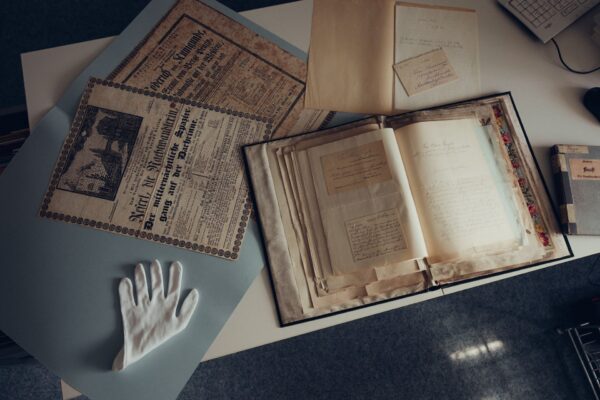Collection of written material
The collection of written material at the Deutsches Theatermuseum includes estates and bequests, collections of autographs, programmes, playbills, a review archive and theatre archives from individual institutions. The focus is on the 19th and 20th centuries, although parts of the collection date back to the 18th century and extend into the 21st century. The collection of documents is therefore one of the central theatre history collections in the German-speaking world and plays an important role in the museum's exhibition and educational work as well as in supra-regional research.

Collection history
The basis of the collection can be traced back to the holdings of the founder Clara Ziegler, which consist in particular of letters, role books, play manuscripts, documents and reviews. In the early years, the collections were still very much interwoven. Under the management of Director Günther Schöne, who ran the museum from 1935 to 1971, the collection was divided into photography, fine arts and written material.
Nachlässe und Autografen
Stock
The extensive estate collection with over 100 items offers in-depth insights into the history of German-language theatre from the 19th to the 21st century. It covers all areas of theatre production, from directing, acting and choreography to stage design.
Estate and bequests
The personal papers and bequests include various written sources such as correspondence, diaries and contracts. One example of this is the estate of the theatre and film actress Marianne Hoppe (1909-2002), which was added to the collection of the Deutsches Theatermuseum in 2016. It is characterised by its particularly coherent content and, with more than a thousand exchanges of letters with personalities such as Gustaf Gründgens, Hermine Körner, Therese Giehse and Hans Lietzau, provides a rich source basis for 20th century theatre and film research. The estate of the influential theatre maker Otto Falckenberg (1873-1947), director of the Münchner Kammerspiele from 1917, is also preserved in the Theatermuseum, as is the estate of the theatre and film actress Adele Sandrock (1863-1937). Sandrock's correspondence with theatre professionals such as Tilly Wedekind, Ida Wüst and Albert Bassermann provides an insight into the theatre and society of her time. Musical theatre is represented by the estate of opera director Günther Rennert (1911-1978), among others; in the field of dance there are sources on the work of choreographers Heinrich Kröller (1880-1930) and Heinz Rosen (1908-1972). Small collections include special objects such as diaries and director's books of the theatre director Max Reinhardt (1873-1943).
Scientific collection
The collection of the literary scholar Albert Köster (1862-1924), one of the fathers of theatre studies as a scientific discipline, contains the oldest manuscript evidence of the collection of written material from the 18th century. Köster's collection includes correspondence from influential theatre professionals as well as the scholar's own notes. The collection came to the Deutsches Theatermuseum in 1925. It suffered partial damage as a result of an air raid during the Second World War.
Single Autographs
The extensive collection of individual autographs includes diaries, notes, letters, collections of material, manuscripts and director's books, which bear witness to the working processes, discourses and networks of theatre-makers since the 18th century.
Theatre archives: History of the institutions
In addition to biographical sources, entire institutions can also be accessed in the form of theatre archives. These include the archive of the Bayerisches Landestheater, which existed until 1947, as well as that of the Kleine Komödie am Max II, which closed in 2008, the historical archive of the Residenztheater Munich and the Gärtnerplatztheater. Small collections, such as those of the Munich theatre Die Kleine Freiheit and the action theatre around Rainer Werner Fassbinder, further enrich the collection.